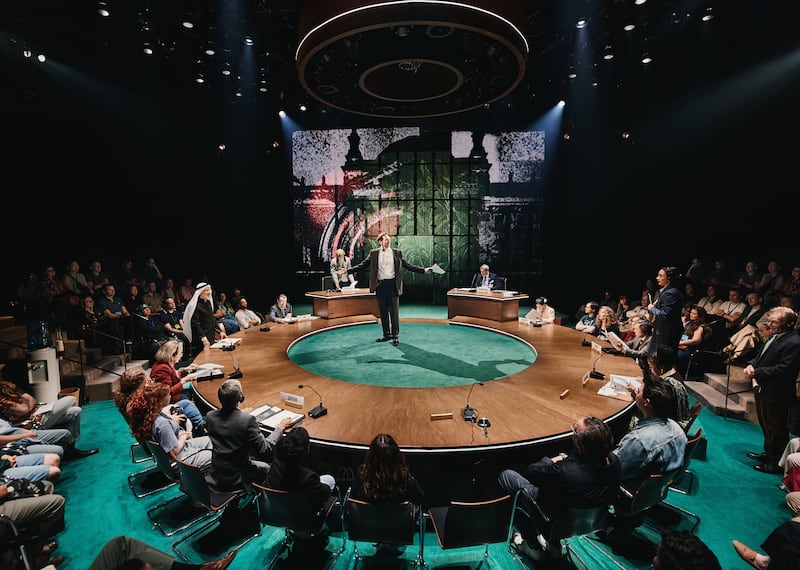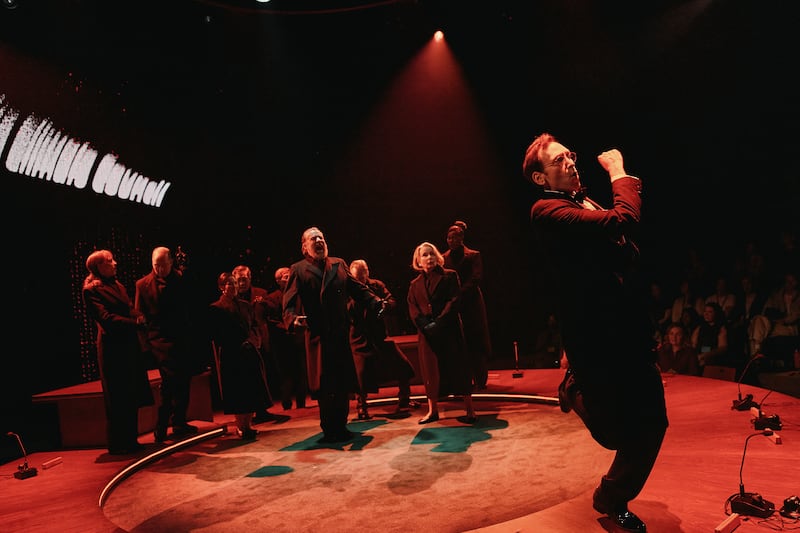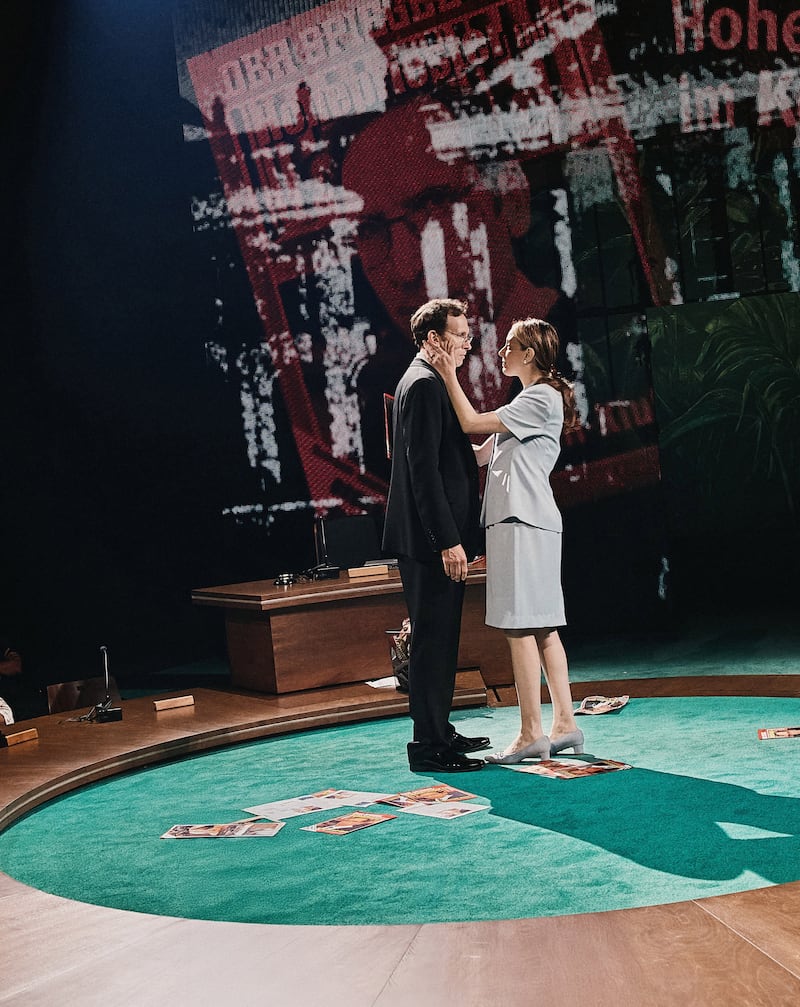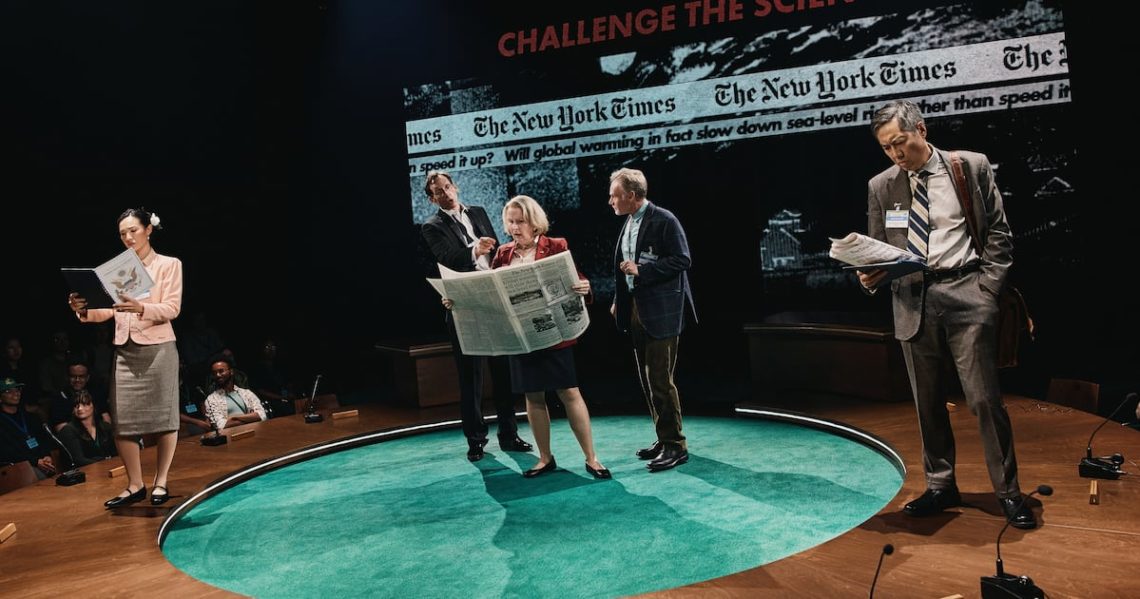The counter-intuitive heart of Joe Murphy and Joe Robertson’s play Kyoto is its focus on the machinations of an apparent villain to tell the story of what turned out to be a significant victory of the good.
That victory—the signing of the Kyoto Protocol in 1997—is the end-highpoint of the play, now recalled as a landmark achievement that didn’t ultimately lead to sustained global change.
By the time of the protocol officially going into force in 2005, 192 countries had signed up to reducing greenhouse gas emissions, but the initial blaze of achievement around its ratification faded next to its long-term lack of vigorous application (and being superseded by the Paris Agreement of 2016).
This Royal Shakespeare Company production—arriving in New York after playing to a wave of acclaim in the U.K. (Lincoln Center Theater, to Nov. 30)—accords to a familiar model of contemporary British playwriting (think the likes of Enron, Stuff Happens, and The Lehman Trilogy). Take a significant real-life news or historical event, stuff it with characters based on real people, and dizzying, overlapping, fast-spoken words—so many words—based on research, technical terms, insider perspectives, and political tussling.

Kyoto is the kind of play—directed as a churning tide of activity and talk by Stephen Daldry and Justin Martin—which proudly displays its own pages of research notes. Over nearly three hours, its aim is to make the endless meetings and vexed negotiations around countries’ climate change commitments look sexy, dense, and also explicable. The play burrows behind the headlines to establish how “Kyoto” came to be.
The human vehicle for its voyage is Don Pearlman (Stephen Kunken), a brilliantly contrarian and provocative choice for a lead character. We watch as Pearlman, a lawyer and oil industry lobbyist, makes it his mission to undermine all efforts at climate change agreements, sneaking around and riling up countries to derail efforts to introduce practically meaningful initiatives and legislation.
The excellent Kunken plays Pearlman as a gangly, besuited Iago, strategically cajoling and whispering poison into the ears of anyone who can help him with his destructive bidding, principally the Saudi (Dariush Kashani) and American representatives (a delightful performance from Kate Burton—bustling, chaotic, and hard-as-nails).
Just like Iago, the furiously focused and sure-of-himself Pearlman strides on and around the stage, periodically facing the audience to keep us informed of his malign efforts, and why he’s doing what he’s doing. Even when he is banned from rooms, the invention of the mobile phone gives him all the access through walls that he needs.

In Pearlman’s eyes, his determination to retain the gas-guzzling, emissions-belching status quo is necessary to keep his paymasters happy (they are envisioned as a massed group in dark overcoats), and to save the world from what Pearlman sees as the destruction of capitalism. Making money is the only wheel of fortune Don sees merit in, and anything and anyone that undermines it must be destroyed.
The objects of his ire include the eloquent dissensions of developing or smaller countries (like Roslyn Ruff as “Tanzania” and Taiana Tully as “Kiribati”) who insist climate change agreements must be executed for their own survival. Inevitably, as so much else, it comes down to money; as a redolent precursor of President Trump’s tariff wars, we see Pearlman leading a charge to weaponize smaller countries’ fiscal weaknesses against them. We also see how time-consuming it is to get anything done, in meetings marked by hours of argument around the words used in commitments and agreements.
Miriam Beuther’s atmospheric set matches the focus of the play, featuring a large round table standing for all the meetings up to and including Kyoto take place around. It is both a forum for debate and a charged, ideological boxing ring. Audience members who sit around it share space with actors who occasionally prevail upon them to answer questions on economics and philosophy.
Opposites attract, and a closeness soon develops between Don and Argentinian lawyer and diplomat Raúl Estrada-Oyuela (Jorge Bosch). Bumbling, tactile, smiley, and deeply idealistic, committed to the idea of international collaboration, understanding, and positive dialog, the charming Estrada-Oyuela initially plays nice to get other countries to sign up to climate change commitments. He beseeches Don to see the goodness in fighting for change, and to think of future generations. But he comes to realize that Don’s modes of attack are themselves useful models to emulate when reason has failed.

The play is less about the debate over climate change—although it does feature scientists and experts vainly presenting evidence, only to be misrepresented and worse—and more about the nuts and bolts of negotiation and conference-floor scheming. Ferdy Roberts is excellent as a recognizably pugnacious John Prescott, then the British Deputy Prime Minister (and the U.K.’s lead negotiator in Kyoto), who recommends endless, exhausting dialog as the ultimate weapon to resolve diplomatic deadlock.
What Don Pearlman was really fighting for, and why that fight didn’t end with his bruising defeat in Kyoto, is captured by Kunken’s mischievously goading performance and by Natalie Gold as his wife Shirley, who comes to realize the gnarly terrain of her husband’s scheming—especially as journalists and more dangerous, darker forces seem to be trailing them. But, she tells the audience in a closing postscript, this is who Don was. He was genuinely committed to his capitalism-at-all-costs principles. A more conventional play might see him redeemed. But her husband never changed, Shirley says, and the play honors his driven, bull-headed certainty.
Kyoto leaves us with a confronting vision of not just Don, but what the Kyoto Protocol itself stood for. It may seem to mean little now in a “Drill baby, drill” industrialized world that seems to be becoming ever more environmentally rapacious. But it did something, the play says, asking us to hold close what Kyoto symbolized: a world coming together in the active service of saving itself. That, Kyoto finally suggests, should not be forgotten—or dismissed.
The post The Most Fascinating Villain of the Year Is on Stage in This Play appeared first on The Daily Beast.




